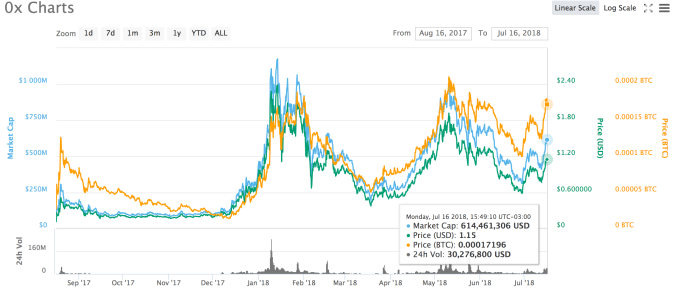Centralized crypto exchanges like Coinbase are easy but expensive because they introduce a middleman. Not-for-profit project 0x allows any developer to quickly build their own decentralized cryptocurrency exchange and decide their own fees. It acts like Craigslist, connecting traders without ever holding the tokens itself. And instead of having to bootstrap their way to enough users trading tokens on their app alone so that there’s liquidity, 0x offers cross-platform liquidity between users on the different projects it powers.
The problem is the user experience of decentralized apps is often crappy compared to the consumer apps we’re used to across the rest of tech. From sign-in to recovering accounts to conducting transactions, it’s a lot more complicated than Facebook Login, PayPal, or Shopify. Bitcoin and Ethereum prices remain well below half their peaks because it’s difficult to do much with cryptocurrency right now. Until the decentralized infrastructure improves, the dreams of how blockchains can improve the world remain distant.
0x is trying to fix that by ensuring developers all don’t have to reinvent the exchange wheel.

It began as a for-profit exchange before the team recognized the massive usability gap. So instead it became a decentralized exchange protocol, and raised $24 million in an ICO for its ZRX token. That’s how relayers — the apps who use it to build exchanges for ERC20 tokens atop the Ethereum blockchain — can charge fees. It also gives those who collect the most a say in the governance of the protocol.
Some of the top projects on 0x like Augur and Dydx are going strong. Last week Coinbase announced it was exploring whether it might list ZRX and several other currencies for trade on its exchange, helping perk up the price after declines since the new year.

0x’s ZRX token price, via CoinMarketCap
Now 0x is putting some of its $24 million to work. It just hired former Facebook designer Chris Kalani to help it improve the usability of its APIs and the products built on top of them. His skills helped Facebook embrace mobile around its 2012 IPO. He then built Wake, raising $3.8 million for the design prototype sharing tool that let teams get instant feedback on their works-in-progress. Kalani sold Wake to design platform InVision in April, and after a few months assisting the transition, he’s joined 0x.
“There are very few designers involved in the [blockchain] space” Kalani tells me. “There’s not a lot of people who had worked on anything at a large-scale or from the consumer perspective. We’re focused on making crypto more approachable.”
Sustaining a crypto not-for-profit
 After talking to four leaders in different parts of the blockchain industry, the consensus was that 0x was an elegant protocol for spawning decentralized exchanges. But the question kept coming up about whether the project will be sustainable. The company doesn’t have to earn enormous amounts of revenue, but concerns about its longevity could scare away developers. One, who asked to remain anonymous, described 0x saying, “the best analogy is trying to monetize Linux.”
After talking to four leaders in different parts of the blockchain industry, the consensus was that 0x was an elegant protocol for spawning decentralized exchanges. But the question kept coming up about whether the project will be sustainable. The company doesn’t have to earn enormous amounts of revenue, but concerns about its longevity could scare away developers. One, who asked to remain anonymous, described 0x saying, “the best analogy is trying to monetize Linux.”
0x is open source, so it could be forked so developers can sidestep ZRX. 0x hopes that the shared liquidity feature will keep developers in line. It only works with the unforked version, and is now being used by 0x-powered projects, including Radar Relay, ERC dEX, Shark Relay, Bamboo Relay and LedgerDex.
While some centralized exchanges have suffered security troubles and hacks, those with stronger records like Coinbase continue to thrive while banking off high fees. That in turn lets them offer better liquidity and invest more in the user experience, widening the gap versus decentralized apps. “People trust Coinbase with large amounts of capital but they wouldn’t trust themselves,” Kalani admits. But he thinks it’s early in the game, and as users become more knowledgeable and comfortable with holding their own tokens for use on decentralized exchanges, 0x and ZRX will thrive.

There’s also competition within the decentralized exchange space from Kyber’s liquidity network, and AirSwap’s peer-to-peer exchange marketplace. But for any of these to thrive, the mainstream crypto owner will have to get better educated. That could fall to 0x.
One alternative path for the not-for-profit would be selling developer services and consulting to those building on top of it. Or it could always do another ICO. But for now, there are a lot of projects out there that don’t want to foot the upfront cost to build their own secure and compliant exchange from scratch. Kalani concludes, “The way Stripe allowed developers and businesses to build on top of it, and not have to worry about regulatory issues and all the infrastructure necessary to take payments, I think 0x is going to do something similar with exchanges for crypto.”
from TechCrunch https://tcrn.ch/2Npco9J
via IFTTT
